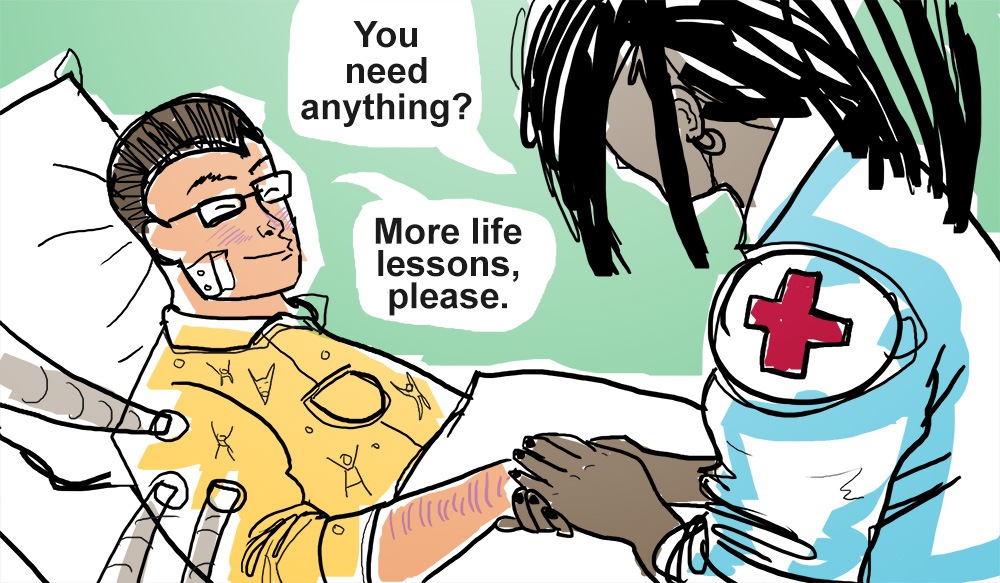
By Mars Dorian, {grow} Contributing Columnist
As I was laying in my hospital bed with dozens of cables attached to my weakened body, I pondered my future (digital) life.
Yeah, it sounds like a cheesy sentence from a soapy beach novel or Hollywood flick, but once you’re dealing with big health issues, it’s amazing how your outlook can change, if you’re willing to learn.
After days of complaining about my situation, my lack of web access and the inability to work, I put on my learning cap and tried to extract value from my painful stay.
Below, I want to reveal the three major social media lessons I have learned from my hospital stay.
1) Ditch the digital debates
This was Mad Mars from the very recent past:
1-Scan Facebook and Twitter feeds
2-Stumble upon statement I (strongly) disagree with and get triggered
3-Engage in threaded debates
I don’t know about you, but I have never changed my opinion because of a Facebook or Twitter debate, and I doubt I have changed anyone’s mind, either. A neighboring patient I talked with said, “if the action you’re about to commit doesn’t improve your personal life, don’t do it.”
Social media debates have never improved my life. Instead, I’ve wasted hours upon hours on reducing complex issues to minimalist comments while getting very, very stressed. And through the various lectures taught at the clinic, I’ve learned that stress, especially when experienced in physical stillness, such as sitting, is extremely dangerous to organs and arteries. Getting angry in front of your screen is killing you.
Come on, 140 characters just aren’t worth it.
2) Reply from a place of potential
I’ve just received a design request from a man who’s apparently selling self-published books based on outdoor survival. I answered promptly and told him how working with me looked like. In the next mail, he wanted to sell me bomber jackets from Yugoslavia with material that felt like felt but wasn’t really.
I wish I could make this up.
Now, I didn’t smile at first. I was already falling back into my old anger mode when I penned the following lines: “Do you want to work with me or are you a &§$% spammer?”
Mad Mars going full reply rage.
Instead, I breathed in and remembered my new credo. I wrote “thanks for the offer, but I have enough jackets as of now.” and went back into the business talk. Who knows? Maybe he still wants to work with me and thought that pitching some of his survival gear was a way to sweeten up the deal.
My ‘new’ reaction seems like a minor thing, but it is a major change in how I deal with people who act in a way I don’t appreciate. The old response would have ‘killed’ any possibility of further collaboration, the second one offered potential.
So every time you have to deal with a challenging client or person online, you can ask yourself: are you reacting with your lizard brain, going full fight response, killing the interaction, or are you acting from a place of potentiality?
I know it’s one of these ‘easier said than done’ one-liners, but you can spontaneously change your conditioned responses by quickly asking a question like:
“How can I reply with respect?” or “How can I turn this into positive response?”
It works for me.
3) Curiosity thrills the cat
One of the patients I noticed during my physical therapy was a middle-aged scrawny man who seemed to befriend anyone in a matter of days. Doctors, patients and nurses soon smiled when chatting with him. I wondered the entire time what his ‘trick’ was. He spoke with a lisp and wasn’t physically attractive, and yet, he won hearts over like a fame thrower. It took me more than a week to crack his secret, but when that man approached me during lunch, I figured it out.
He was a friendly-forward questioner. Instead of blabbering about himself, he focused on me exclusively and asked curious questions about why I was in hospital and what my passions were. When I told him about my creative online career, his eyes lit up. Maybe he was faking it, which I doubt, but I can tell you, my ego skyrocketed. No words could have accomplished the same positive emotion.
In today’s fiery fight for attention, getting listened to can be the greatest rapport builder. Instead of wondering about the right word choice and topics when connecting online, make your partner the topic of the conversation.
Conclusion
During the hospital stay, I was cut off from the web and my work, but instead of constantly crying about it (well, I did for a week), I focused on the people I was forced to live with and learned lessons for the (digital) life. Social media, like business, is always about people, and if you get inspired by my principles, you may take your online interactions to a new level of opportunity.



